Classic Studies in Christian Apologetics (14 vols.)
Digital Logos Edition
Overview
Discover a trove of resources for defending the Christian faith with the Classic Studies in Christian Apologetics Collection. Scholars from a broad range of theological traditions set forth time-tested arguments for Christian truth. The books range from beginner’s guides to detailed treatments of complex philosophical ideas. Explore the thought of the earliest apologists. Find reasoned answers to lingering questions about the Christian faith. Quickly reference manuals on difficult Christian doctrines. The volumes in this collection are designed to equip you to winsomely and confidently reason with unbelievers—and find answers to your own questions.
Interested in apologetics? Try Mobile Ed: Apologetics Bundle (4 courses).

- Includes contributions from a broad range of scholars
- Responds to objections to Christianity
- Provides introductory, intermediate, and advanced resources
- Title: Classic Studies in Christian Apologetics
- Volumes: 14
- Pages: 4,424
- Christian Group: Evangelicals
- Resource Type: Topical
- Topic: Philosophy and Apologetics
- Apologetics, or the Rational Vindication of Christianity by Francis R. Beattie
- Apologetics, or Christianity Defensively Stated by Alexander Balmain Bruce
- Apologetics, or the Scientific Vindication of Christianity, vol. 1 by J.H.A. Ebrard
- Apologetics, or the Scientific Vindication of Christianity, vol. 2 by J.H.A. Ebrard
- Apologetics, or the Scientific Vindication of Christianity, vol. 3 by J.H.A. Ebrard
- An Introduction to the Study of Christian Apologetics by Arthur R. Gray
- A Handbook of Christian Apologetics by Alfred Ernest Garvie
- A First Primer on Apologetics by Robert Mackintosh
- Apologetics: A Treatise on Christian Evidences by Ezekiel Boring Kephart
- The Freedom of Authority: Essays in Apologetics by J. Macbride Sterret
- Apologetics, or a System of Christian Evidences by Conrad Emil Lindberg
- A Manual of Apologetics by F.J. Koch
- Christian Apologetics of the Second Century by Phillip Carrington
- The Testimony of Reason by Samuel L. Phillips
This title is included in the following collections
You can save when you purchase this product as part of a collection.
Logos 8 Baptist Gold Legacy Li...
$849.99$849.99Logos 7 Baptist Gold Legacy Li...
$849.99$849.99Logos 9 Baptist Gold Legacy Li...
$849.99$849.99Logos 8 Baptist Platinum Legac...
$1,499.99$1,499.99
- $1,499.99
- $1,499.99
- $2,999.99
- $2,999.99
- $2,999.99
- $4,749.99
- $4,749.99
- $4,749.99
- $21,749.99
- $24,999.99
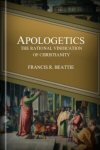
Appreciate a Reformed approach to apologetics with this volume by Presbyterian professor Francis R. Beattie. Beattie argues that the best way to defend Christianity is to present the inherent strength of its doctrines. He demonstrates the rational ground of Christian teaching by way of contrast with competing views and an exploration of proofs for the validity of Christianity.
Francis Beattie (1848–1906) was professor of apologetics at Presbyterian Theological Seminary in Louisville, Kentucky. He is the author of the commentary The Westminster Standards and Apologetics, or the Rational Vindication of Christianity.
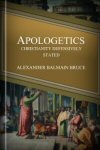
Explore responses to doubts about the Christian faith. Alexander Balmain Bruce experienced an intense crisis of faith during his college days. After overcoming his doubts and entering the ministry, he set out to provide a rational basis for Christian beliefs. Written for Christians facing similar struggles, Apologetics, or Christianity Defensively Stated reflects Bruce’s view of apologetics as an “aid to faith against doubts.”
Alexander Balmain Bruce (1831–1899) was professor of New Testament exegesis at the Free Church College, Glasgow. He is most remembered for his work The Training of the Twelve.
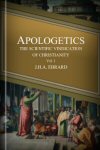
When Darwinists called into question central tenets of Christianity, J.H.A. Ebrard undertook a massive work in their defense. Apologetics or the Scientific Vindication of Christianity demonstrates the legitimacy of Christian belief in the light of modern science. In the first volume, Ebrard explores the nature of apologetics, the moral law, epistemology, the Fall, and redemption.
J.H.A. Ebrard (1818–1888) was a German theologian influential to Charles Hodge. Although affiliated with the Lutheran Church, he was theologically Reformed. He is the author of Apologetics, or the Scientific Vindication of Christianity.
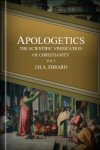
In the second volume of Apologetics or the Scientific Vindication of Christianity, Ebrard directly addresses Darwinism. He also questions the reality of free will and compares Christianity to other religions.
J.H.A. Ebrard (1818–1888) was a German theologian influential to Charles Hodge. Although affiliated with the Lutheran Church, he was theologically Reformed. He is the author of Apologetics, or the Scientific Vindication of Christianity.
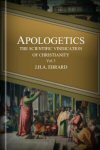
In the third volume of Apologetics or the Scientific Vindication of Christianity, Ebrard continues his evaluation of world religions and concludes with a discussion of divine revelation and redemption.
J.H.A. Ebrard (1818–1888) was a German theologian influential to Charles Hodge. Although affiliated with the Lutheran Church, he was theologically Reformed. He is the author of Apologetics, or the Scientific Vindication of Christianity.
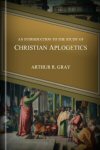
Learn apologetics from a distinctly Episcopalian point of view. Writing especially for ordination candidates in the Episcopal Church, Arthur Gray presents basic apologetics for ministers. According to him, most approaches to apologetics fail to distinguish between naturalism and idealism. He explores the differences between these worldviews, asserting that only those who share a belief in idealism will be convinced of Christian claims.
Arthur R. Gray (1875–1933) was a chaplain and professor at the University of the South in Sewanee, Tennessee. He is the author of An Introduction to the Study of Christian Apologetics.
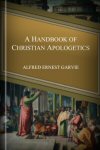
Overview arguments for Christianity on topics ranging from the existence of God to eschatology. Alfred Ernest Garvie presents the attractiveness of the faith rather than becoming entangled in tedious arguments. He systematically covers every major Christian teaching, making this handbook a helpful reference for anyone looking for appealing summaries of specific doctrines.
Alfred Ernest Garvie (1861–1945) was a Congregational minister and seminary professor. He is the author of The Ritschlian Theology and A Handbook of Christian Apologetics.
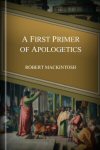
Quickly learn basic arguments for the Christian faith in this primer designed for the novice apologist. This short work contains three introductory chapters on the nature of apologetics, faith, and reason. The remaining chapters address topics such as the sinlessness of Jesus, the resurrection, difficulties in the Old Testament, and miracles.
Robert Mackintosh (1858–1933) was a Congregationalist minister and professor of apologetics at Lancashire Independent College. His numerous works include Christianity and Sin, Hegel and Hegelianism, Essays towards a New Theology, and A First Primer of Apologetics.
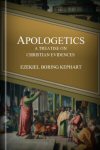
Defend the legitimacy of Christian revelation with Apologetics: A Treatise on Christian Evidences. Ezekiel Boring Kephart believes that arguments for God’s existence belong to the field of theology. Therefore, he focuses his attention on the inspiration of Scripture, miracles, and prophecy as proofs for the Christian religion. This book will equip you to dialogue with those who believe in the existence of God but reject the claims of Christianity.
Ezekiel Boring Kephart (1834–1906) was a writer, preacher, and educator in the church of the United Brethren in Christ. He is the author of Apologetics: A Treatise on Christian Evidences.
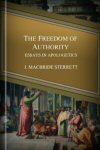
Take a dialectic approach to apologetics with The Freedom of Authority: Essays in Apologetics. German philosopher Georg Wilhelm Friedrich Hegel greatly influeced J. Macbride Sterrett. In these essays, Sterrett employs Hegel’s dialectic method in the defense of Christian beliefs. His reflections will help you interact with some of the most complicated ideas in twentieth-century philosophy.
J. Macbride Sterrett was the head professor of philosophy at George Washington University. He was a Hegelian scholar and author of The Freedom of Authority: Essays in Apologetics, Studies in Hegel’s Philosophy of Religion, and The Ethics of Hegel.
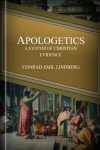
Grasp the full breadth of apologetic approaches with this textbook by a Lutheran scholar. Conrad Emil Lindberg doesn’t limit himself to a defense of the inspiration of Scripture, the evidence from Christian experience, or a study in comparative religion. His work encompasses all of these approaches, answering the need for a comprehensive overview of apologetic methods. His brief treatment is a crash course in the history and various schools of Christian apologetics.
Conrad Emil Lindberg (1852–1930) was a professor of theology at Augustana College. He is the author of Apologetics, or a System of Christian Evidences.
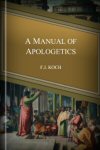
A Manual of Apologetics will equip you to make a comprehensive defense of the Christian faith from a Roman Catholic perspective. With in-depth arguments for the existence of God, the inspiration of scripture, and the work of redemption, this volume will interest any Christian. Chapters on the papacy, infallibility of the Catholic Church, and the authority of Sacred Tradition clearly responds to objections to Catholicism.
F.J. Koch was a Roman Catholic priest and author of A Manual of Apologetics.
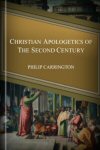
Acquaint yourself with the lives and thought of the earliest Christian apologists. This brief overview of second-century apologetics presents the major ideas of early Christians like Justin Martyr and Tertullian. With a final chapter relating second century apologetics to modern thought, Philip Carrington’s succinct work will help you understand the relevance of classic apologetics.
Philip Carrington (1892–1975) was an Anglican priest, bishop of Quebec, and metropolitan of Canada. He is the author of Christian Apologetics of the Second Century.
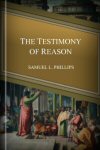
Use the tools of reason to construct an argument for the Christian faith. Samuel L. Phillips asserts that many of the important truths of Christianity can be established from facts most people believe. In The Testimony of Reason, he establishes common ground with unbelievers, demonstrating that they already believe in basic truths which lead to the Christian religion.
Samuel L. Phillips is the author of The Testimony of Reason.
Reviews
3 ratings
AeliusCicero
8/7/2015
Al Sosa
6/1/2015

Mr. Youngblood
6/1/2015